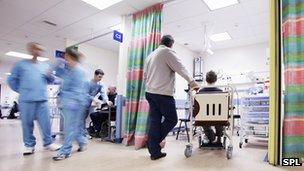NHS controversy: A sign of things to come?
- Published
- comments

Lewisham is not the only A&E unit which faces being downgraded
Despite the concessions made over Lewisham's A&E unit, the changes could still have a profound impact on health care in this corner of London - and the whole NHS for that matter.
The official line is that the plan to change it to an urgent care centre has been stopped by ministers who have listened to concerns.
But make no mistake the A&E - currently classed as a major type one unit - is still being downgraded.
The plan may only mean a quarter of the patients using the unit are affected as the rest will still be able to get the treatment they need from the service that emerges from the reorganisation.
But the absence of those quarter, who will end up being treated at nearby hospitals, will have a profound impact. They will be the sickest, most life-threatening cases who are ferried to hospital in ambulances.
Without them Lewisham will not need its critical care unit and perhaps a host of other associated services.
Hospitals are complex organisations. Removing one thing has a ripple effect across the rest of the hospital.
The plan means Lewisham starts to move away from what many would associate a hospital to be.
Instead, it will focus much more on planned care, such as knee and hip replacements, and non-emergency cases.
Only those who are at no immediate risk will be taken to Lewisham, this could include the elderly person who has had a fall and needs a little supervision to someone who has twisted their ankle.
'Dangerous precedent'
But this shift is not unique to this area of south London.
Up-and-down the country similar issues are arising.
Specialist care, from dealing with strokes to carrying out heart surgery, is getting more complex. It means it has to be provided at fewer sites where highly-trained teams of staff can be concentrated.
That shift has already started happening. But it is one of the reasons why there are NHS trusts across the country that are struggling to balance the books.
There are another 20 or so trusts with deep-rooted problems that mean their finances are at risk of spiralling out of control.
None have quite built up the scale of problems that south London has. But that does not mean they are not closely watching what is happening and wondering if they will be next.
But the controversy over Lewisham also raises the question of how best these changes - or reconfigurations as the NHS calls them - should happen.
Central to the complaints of Lewisham residents and indeed many of the health staff working at the hospital is that they are being penalised because of the problems built up at another trust.
Lewisham is not part of South London Healthcare, the financially-troubled trust that was put into administration.
Instead, it found itself involved after the administrator brought in to sort out the problems concluded he needed to look at the wider local health economy rather than one individual trust.
Shadow health secretary Andy Burham has claimed this represents a "dangerous precedent".
But one of the attractions of the administration process - which was created by Labour when they were in power - is that it is quick.
Other reconfigurations that have not used legislation, such as in places like Greater Manchester, have taken years to push through.
But that timescale means problems fester and mount.
Chris Ham, head of the influential King's Fund think-tank, says resorting to such measures should be a "last resort and must not become a back-door route" to change.
He and many others are calling for an open and honest debate about the future of healthcare and hospitals in particular.
What is happening now in south London could define if and how that debate happens.